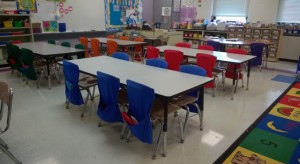Minooka District 201 going to full-day kindergarten
Judy Harvey — May 12, 2015Beginning with the 2015-16 school year, kindergarten in School District 201 will be for a full seven-hour school day. The School Board on April 29 voted unanimously to move from a half-day program to a full day.
The district may offer a half-day program based on interest level from the community, according to the district’s website. Children living in the district who will turn 5 on or before Sept. 1 will be eligible for kindergarten for the upcoming school year.
Minooka is going the way of most districts in the state and of those in Kendall and Kane counties, who have had full-day kindergarten for a few years now.
More than 80 percent of schools in Illinois have a full-day kindergarten program and three-quarters of all kindergartners in the state are enrolled in a full-day program.
Plano School District 88 has full-day kindergarten at one building, P.H. Miller Elementary. Oswego District 308 had a pilot program for a few years before offering full-day kindergarten to all families in the district beginning with the 2011-12 school year.
East Aurora opened a new full-day kindergarten center in the fall of 2014 and Indian Prairie School District 204 in Aurora and Naperville launched its all-day kindergarten in the 2008-09 school year.
However, both Yorkville School District 115 and Plainfield School District 202 still have half-day programs. Full-day kindergarten is one of the topics being discussed as part of District 115’s strategic plan development, which is expected to be completed during the 2015-16 school year, according to the district’s website.
The subject of full-day kindergarten came up during the school board elections this spring in Plainfield District 202, with candidates debating when the district can and should go to a longer day for kindergartners.
Plainfield offers a full-day program for special education students but the half-day is still in place for the general student population.
Four years ago, the district included transitioning to full-day in its long-term planning but the administration has maintained that at this time it does not have the space for it.
Building space is one factor districts cite in determining expansion of kindergarten programs. Another key issue is increased personnel costs with adding more staff.
Although, academically, the investment is seen as a long-term payoff as studies have shown students benefit from a full day of kindergarten.
Children who do attend a seven-hour class often show higher reading and math skills as they enter first grade than those who go half-day and schools say there is less intervention needed for the full-day student as he progresses through later grades, based on research at both the state and national levels.








